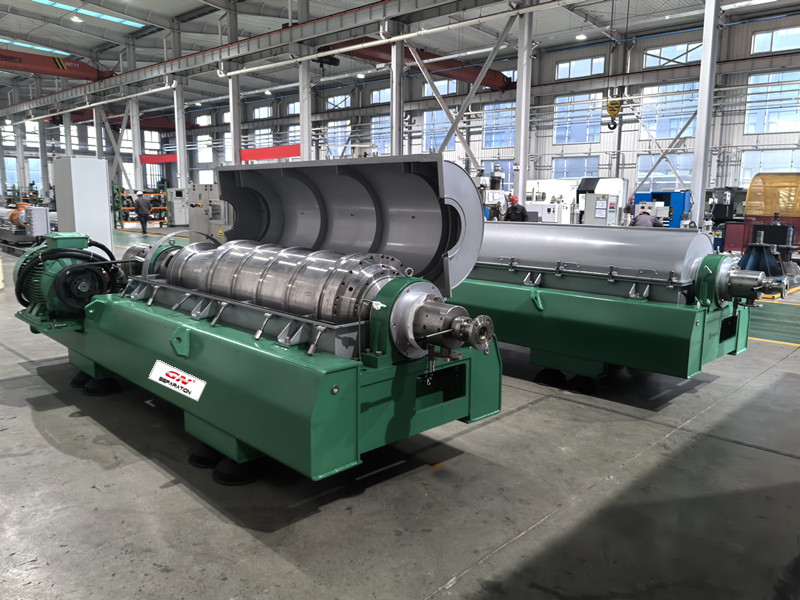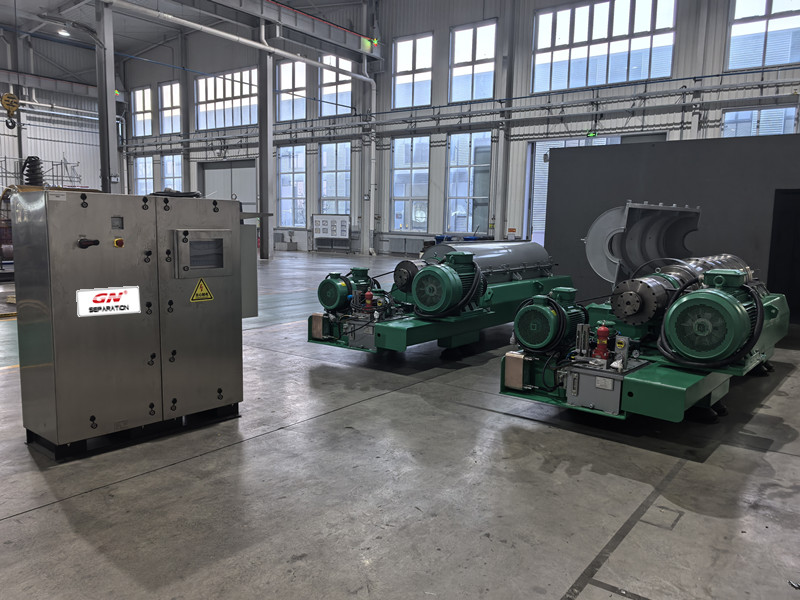GN 3 Phase Decanter Centrifuge for North Africa Waste Oliver Oil Slurry Treatment
Recently, GN Separation has successfully completed the manufacture and factory testing of two sets of GNLWS554 Three-Phase Decanter Centrifuges. These machines have been dispatched to a client site in North Africa, where they will play a pivotal role in recovering oil from olive oil sludge, a byproduct of olive oil production.

The Working Principle of 3-Phase Decanter Centrifuges
3-phase decanter centrifuges are sophisticated pieces of equipment designed to separate mixtures into three distinct phases: solids, a light liquid (often oil), and a heavy liquid (such as water). The process begins when the feed mixture is introduced into the centrifuge bowl, which rotates at high speeds. Centrifugal force then exerts a powerful separating effect, pushing the heavier components (solids and heavy liquid) towards the bowl wall while the lighter liquid migrates towards the center.
Within the bowl, a scroll propeller gently conveys the settled solids towards the discharge end, preventing them from being re-entrained in the liquid phases. Simultaneously, the light liquid and heavy liquid discharged from different outlets.
Application in Olive Oil Production and Sludge Treatment
Olive oil production generates considerable amounts of waste sludge, which contains significant quantities of reusable oil. Traditional methods of disposing of this sludge are not only environmentally unsound but also waste valuable resources. The GNLWS554 centrifuges offer a sustainable solution by efficiently separating the oil from the sludge, allowing for its recovery and potential reuse in the production process or for other applications.

GN Separation's GNLWS554 Centrifuge: Key Features
GN Separation's GNLWS554 3-Phase Decanter Centrifuges stand out for their design and robust construction, making them suitable for demanding applications like olive oil sludge treatment. One notable feature is the use of duplex stainless steel for the primary rotating components. This material choice ensures high corrosion resistance, critical in handling oil-laden sludge, which can be corrosive.
Moreover, the centrifuges employ a centrifugal casting process to enhance the dynamic balance of the rotating parts. This precision engineering reduces vibrations and wear, extending the lifespan of the equipment and ensuring smooth, continuous operation. The resulting stability is particularly advantageous in environments where downtime can be costly and disruptive.
Another aspect is the adoption of a centripetal pump design to regulate the interface between the light and heavy liquid phases within the bowl. This adjustable feature allows operators to fine-tune the separation process during runtime, ensuring that the centrifuge consistently achieves the desired separation efficiency..

In conclusion, with the use of advanced materials and innovative technologies, GN Separation's 3-Phase decanter centrifuges make them highly effective tools for recovering valuable oil from waste sludge. For more information, please feel free to contact GN.
